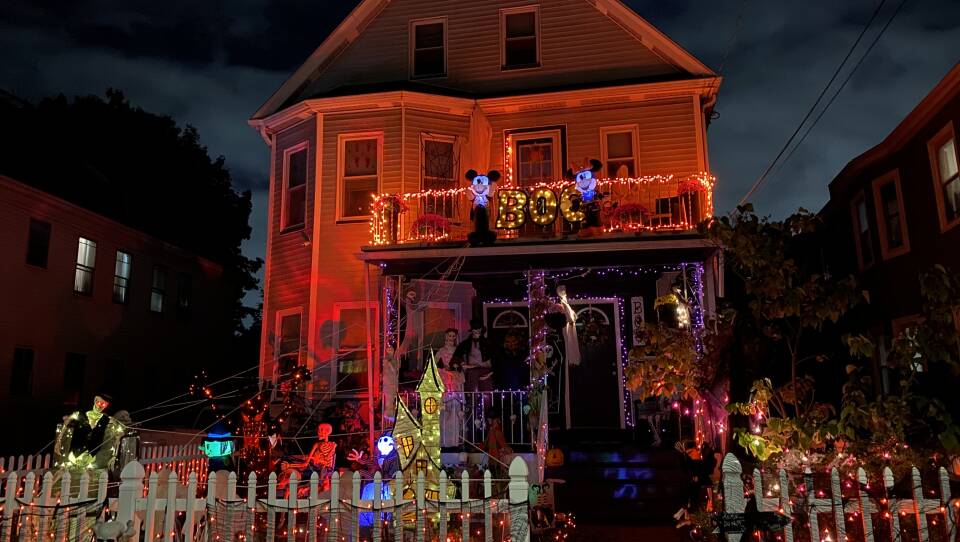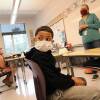With Halloween almost here — and Thanksgiving and December holidays on the way — epidemiologist Dr. Cassandra Pierre shared her advice on how to stay safe in a pandemic without sacrificing beloved traditions. Pierre, the medical director of public health programs at Boston Medical Center, said, with caveats, that she’s not expecting as big a spike in cases during the holidays. GBH News reporter Mark Herz spoke with Pierre Wednesday, who offered tips on celebrating responsibly. The following transcript has been edited for clarity.
Mark Herz: What’s your advice for this Halloween?
Dr. Cassandra Pierre: If there was any major holiday that was really wonderfully made for COVID-19 safety, Halloween would be the one, right?
It's takes place largely outdoors, physical distancing is absolutely possible and potentially preferred and there are ways of distributing candy that don't necessarily invite people into indoor spaces or into close proximity.
Many people last year who are invested in maintaining the Halloween tradition came up with a system whereby people could grab candy at the end of the yard, a bucket that contained candy. And I guess children were on the honor system to take just one piece each.
So I do think that trick-or-treating is absolutely possible. I would continue to recommend against indoor festivities — no bobbing for apples, that definitely isn't a COVID-friendly activity. But trick-or-treating in an outdoor space with physical distancing involved, and lots of costumes coming built-in with masks is a good tradition to safely engage in.
Herz: How different or similar will Thanksgiving be, compared to last year, in terms of your advice to people?
Pierre: Unlike last year, we are not expecting a significant spike in COVID-19 cases. But as people move indoors, gather together, we do expect that the numbers will rise. And of course, there's always the potential curve ball — although we hope it doesn't happen — of a variant arriving on our doorstep.
I think that we have put our lives on hold for so long. And I personally am cautiously beginning to plan.
But I am also maintaining a sense of flexibility and adaptability, building that into my plans, because we do know that there is the possibility of having multiple variants arise that may have significance — some variants wither away, and some grow steam.
I do hope with our highly vaccinated community, that we will be able to withstand cases, transmissions — even from variants. But the truth is, is that we have a largely under-vaccinated world, and we have open borders. We have travelers from all over. So I would not say that we should anticipate high numbers of cases from a new variant, but that should be built into our plans as a contingency, because we don't know what will happen. And COVID has surprised us on a number of occasions.
Herz: What about family get-togethers with young kids who aren't vaccinated? What's the advice there?
Pierre: We have to take into account a number of things. One of them, of course, is the number of people who will be vaccinated, fully vaccinated. I think that is incredibly important. Having the majority of all the people at the table present vaccinated will significantly lower risks of transmissions or severity of disease should breakthrough events happen.
Now, of course, they're going to be children who are unvaccinated, or others who may not be able to get vaccinated. And so what we have to think about is making sure that all of the adults in their vicinity can shield them.
We can make sure that people are not symptomatic when they're sitting down at the table, try to get some good ventilation — whether it's either opening up a window or having air filtration going on.
The other thing that I also say about holiday gatherings is that we don't have to forget about our other layers of protection. So some people might very well decide to engage in pre- and post-event COVID-19 testing. There are many venues to do that, including your home now, with at-home testing. So I would recommend that additional layer protection, especially if there are unvaccinated individuals like children who are not yet eligible for the vaccine at an event. So that would be another way to protect. But the most important thing, again, is to have every single eligible individual vaccinated.
Herz: And what about this year’s flu season, what are your concerns?
Pierre: We highly recommend getting the flu vaccine because it does decrease flu-related illness, hospitalizations and severe outcomes.
And it decreases the congestion that we are unfortunately continuing to see in our emergency departments and hospital spaces. Of course, the congestion that we're having right now is not due necessarily to COVID-19 cases, but more due to the buildup of chronic issues that have gone largely untreated or not well-managed during the pandemic. So anything that we can do to offload the stress that is happening in the emergency departments... to allow really sick people to get treated would be welcome.
And as always, getting vaccinated protects you, but also protects vulnerable individuals: people in your community who are at higher risk of having severe disease with influenza. So there are a lot of good parallels for why we should get vaccinated for influenza, with what we've been talking about for the past few months with COVID-19.
And the additional concern here, of course, is that, because of masking and physical distancing, last year we did not see flu— we had a year essentially without influenza. I can count on one hand the number of cases we saw in our hospital, which just has never happened before.
But there is a concern that that has led us to be more susceptible potentially to influenza because we have gone a year without building up that immunity in the interval between flu seasons. And so we may be more susceptible to influenza as we get out and about, and celebrate and gather together with loved ones. So all the more reason to get vaccinated for the flu.








